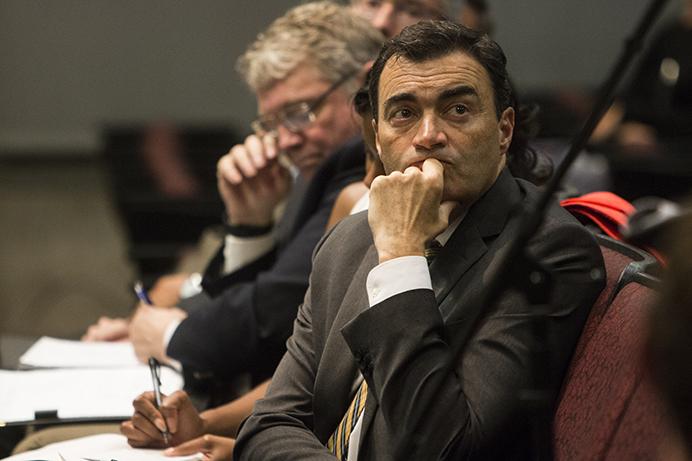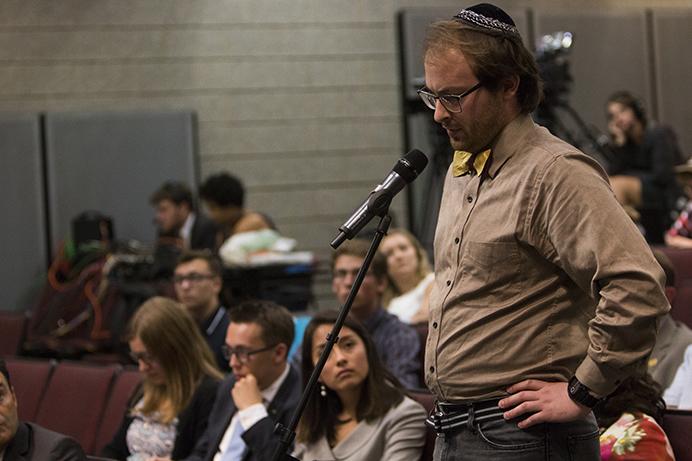The University of Iowa’s five-year tuition plan, while practical, seems to some people to signal that the UI administration is “throwing in the towel” on efforts to find an affordable deal for students.
On Aug. 14, the UI administration proposed an annual increase of 7.08 percent in resident undergraduate tuition through fiscal 2022 at a state Board of Regents Tuition Task Force meeting in Biology Building East.
If approved, resident undergraduate tuition would climb from $7,486 this fall to $10,537 in the fall of 2022. For nonresident undergraduate tuition, the proposed annual increase is 2.08 percent each year, which will take tuition from $29,130 this fall 2017 to $32,288 in the fall of 2022.
UI President Bruce Harreld said the difference in tuition rates between residents and nonresidents largely came out of discussions with student leaders.
“As we listened to students, it was pretty clear — and that data actually say the same thing, that we’ve actually taken our tuition over the last, say, five years, up much more aggressively out-of-state,” he said. “The student leaders … said, ‘We’ve gone pretty far there.’ ”
Several people who spoke at the meeting expressed concern that, although Iowans view education as one of the state’s values, the trend of disinvesting in higher education and the rising costs of postsecondary education suggest otherwise.
Regent universities saw more than $20 million in reductions in state appropriations midyear during fiscal 2017 as the result of a state budget shortfall upwards of $100 million.
“The actions of our state government make me question whether our state elected leaders continue to support this core value of Iowans,” UI Staff Council President John Laverty said.
There is untapped potential for lobbying the state Legislature, UI Student Government President Jacob Simpson said at the task force meeting.
“Compared to other universities, our political engagement has room to grow,” he said. “I would add that we have not effectively made the case to general Iowans about why they should fund our institutions.”
RELATED: Harreld proposed to raise tuition consistently for five years
Landon Elkind, the former president of Campaign to Organize Graduate Students, said the UI’s plan is an acknowledgement of the likely reality that the Legislature would not fund the regent universities, but he ultimately views the proposal as a surrender and a failure lacking in leadership.
It also up to the regents to advocate for funding the universities, Elkind argued. He said the regents are not truly feeling the pain of the students whose tuition they vote to increase each year — and in recent years, that vote has occurred more than once.
“I haven’t seen any op-eds, I haven’t heard you on the radio, and I haven’t heard much,” he said. “I haven’t heard you addressing large gatherings of Iowans. I haven’t heard any lobbying, really. I’ve heard some sort of tepid statements from the [regents under former Regent President Bruce Rastetter] as if it was a minor inconvenience — ‘Oh, we have to raise tuition again.’ ”

Simpson said he does support moderate tuition increases to prevent the UI from suffering from a lack of resources, provided financial-aid increases more than proportionately. Harreld said any additional state resources above the fiscal 2018 base of $217 million would be dedicated to increasing those resources.
Rather than focusing solely on providing financial aid to Iowans, Harreld said, if there is a rise in revenue provided by the state, the UI needs “to focus on those that need it and those that merit it.”
As a first-generation student who was largely unaware of opportunities that could make a university education more affordable, UISG Vice President Lilián Sánchez said the UI met her needs, but she fears that for many, that dream is becoming unattainable.
“Many first-generation, low-income, and underrepresented students dream of attending a school like the University of Iowa,” she said. “The truth is this American dream of pursuing a higher education is becoming less and less feasible. If we continue in the direction we’re heading, I fear that the University of Iowa will no longer be an affordable institution.”



